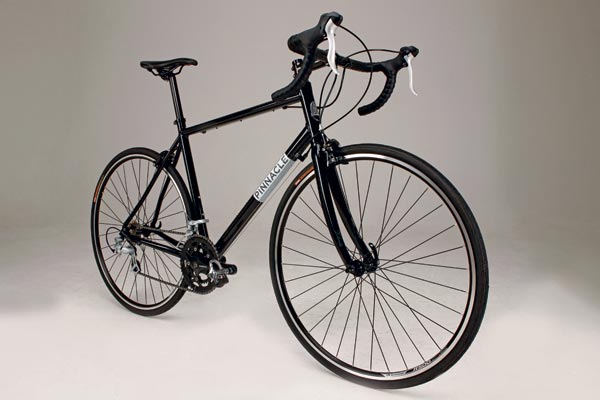Pinnacle Dolomite One 2012 review

In all, the Dolomite One is a solid, stable performer. In both aesthetic and performance terms, it's probably the least striking machine here, but that's not always a bad thing. As a reliable, efficient, general-use bike, it'll do you proud.
-
+
Subtle, classy looks
-
+
Rack mounts
-
+
Good all-rounder
-
-
Harsh ride
-
-
Brakes
You can trust Cycling Weekly.
I'm as blinded by pretty paintwork as the next bike fancier, but I've a soft spot for the rather plain Pinnacle brand.
That favouritism isn't for any personal reason (I've never owned one) but they remind me of the best traditions of family-friendly British transport design: modern two-wheeled versions of the Mini or Morris Minor. They're not flash, just quietly efficient, and they look utterly dependable.
Last year I tested the Arkose One cyclo-cross bike, an £850 rough-stuff-capable, do-it-all that was probably the best multi-tasking machine I swung a leg over in 2011. This Dolomite One is far more of a smooth surface specialist but it isn't a one-trick pony. There are mounting points for a rear rack, deep-drop brakes, so you can fit mudguards and helpfully high-volume 26c tyres.
This year's range from Pinnacle isn't a huge leap from last year's selection, although the bikes have undergone a slight tweaking in their geometry by new brand designer James Olsen, the man who made his mark with Genesis bikes. In truth, the Dolomite One looks ‘right' from the start.
It's a nicely proportioned compact frame with a generous head tube length, and the selection of Shimano 2300 kit doesn't let the side down aesthetically. Even the simple black-and-white colour-scheme exudes subtlety rather than stinginess.
Let's talk about 'sets
Now, for a moment let's consider groupsets and, specifically, how they operate. The Vitus had Shimano 105 STI levers which move the chain down via a small paddle beneath the brake lever, while the paddle and brake lever pivoting in unison move the chain up.
The latest race content, interviews, features, reviews and expert buying guides, direct to your inbox!
The GT had Microshift levers featuring two paddles: clicking the small one moved the chain down; pushing the big one moved the chain up; the brake lever remained fixed. On the Pinnacle, we have Shimano 2300 and another system again. Here, a small thumb button clicks the chain down while a pivoting brake lever moves it up.
Snobs will argue it's not a ‘proper' Shimano STI system, but I think it works very well. If anything, it's more intuitive than other systems because it doesn't utilise two versions of essentially the same movement.
It's easy to remember what happens when you click with your thumb, and what else happens when you push with your fingers. In fact, the whole 2300 drivetrain is not to be sniffed at. Sure, it's cheap and less refined than posher options, but it works flawlessly.
Slightly less impressive is the braking action that comes with those levers. Taking on a fast descent is best done on the drops; that way, you can just about get enough leverage to slow yourself down. Squeezing from a position on top of the hoods doesn't do much when things get desperate.
Bump and grind
Given the conventional albeit compact shape of the Dolomite's frame, I was expecting a more forgiving ride than we experienced on the GT - and it was, but not by much. In fact, it's a pretty typical aluminium riding experience: big bumps kick you up the backside, while rough surfaces rattle the fillings. Even the inclusion of those relatively chunky tyres doesn't do much to soften the blow.
Despite that, the rear of the bike is just a tad more relaxed than on the GT, so it tracks the under-tread surface well, especially on climbs. That means you can get the hammer down and not be ping-ponging all over the hill. It's also a sweet, sweeping kind of descender. The downside to this is that it doesn't quite have the instant fun factor of the GT - it doesn't go like a rocket when you sprint, and you won't be jinking it round corners.
Founded in 1891, Cycling Weekly and its team of expert journalists brings cyclists in-depth reviews, extensive coverage of both professional and domestic racing, as well as fitness advice and 'brew a cuppa and put your feet up' features. Cycling Weekly serves its audience across a range of platforms, from good old-fashioned print to online journalism, and video.